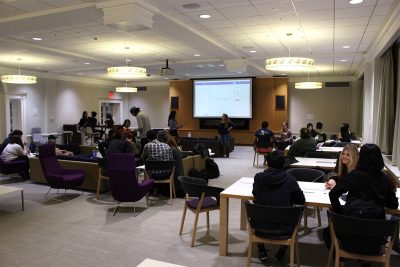
At Boston University’s Kilachand Hall, students played a game with topics ranging from black history, to Disney, to fill-in-the-blank lyrics. However, there was also a topic that might have seemed unsuspecting to a passing bystander: women’s history.
The trivia night, hosted by the International Women’s Academy’s BU Chapter, was a small gathering with a deep-rooted message: to raise awareness for the lack of equitable feminine hygiene products for underprivileged women.
The nature of this event was specifically coordinated to be unsuspecting. While students enjoyed boxes of Domino’s pizza, Dolly Parton’s “Jolene” and Beyoncé’s “7/11” played in the background.
To be admitted, attendees had to bring a box of tampons or pads to be donated to a women’s shelter in Boston, with the goal in mind to raise awareness for underprivileged women who do not have consistent access to necessary feminine hygiene products.
“Many women do not have access to feminine hygiene products, and this is something that we want people to have access to in the future,” said Trisha Bhatia, president of BUIWA.
“That’s where a lot of our efforts go to, trying to bridge that gap,” said Bhatia, a sophomore in the College of Arts and Sciences. “And we thought this was a good way to do it, with trivia! Pizza!”
Bridging this access gap and finding a way to de-stigmatize feminine hygiene products can have a large impact on underprivileged women, Bhatia said.
Olivia Ferris, an IWA service chair, volunteers at the Women’s Lunch Place on Newbury Street. She noticed a need for feminine hygiene products among homeless and low-income women who visited the shelter.
“I think it’s an awkward topic for a lot of people,” said Ferris, a sophomore in BU’s Sargent College of Health and Rehabilitation Sciences. “Even when I go to the shelter, I can see that it’s awkward to ask for it.”
The Women’s Lunch Place, along with other Boston-based organizations such as Rosie’s Place, are shelters designed to help underprivileged women find safe spaces where they can take care of themselves, from providing women with showers to accepting personal care items including tampons and pads.
Providing these women with a safe space to restore dignity paves a way for disadvantaged women to have access to care that is extremely important, but often times forgotten because it is a uniquely female issue.
Adam Joyal, a sophomore in CAS, said it’s important to provide these women with resources beyond food and shelter.
“You can’t have half the population fighting for themselves and then not being recognized by the other half,” Joyal said.
Taking a lead in female nonprofits located throughout the city of Boston, BU’s chapter of IWA found a way to allow students to participate on campus in breaking the taboo of menstruation.
“We go to BU, we’re privileged here,” Bhatia said. “But the fact that there are so many people out there that don’t have access to it and it’s something that we really take for granted and I don’t think a lot of people even recognize that.”
Morgan Cope, a sophomore in CAS, said it’s important to bring awareness to BU’s community.
“I think it’s really cool because it’s for such a good cause and people are able to bring these feminine hygiene products that are really going to help people in the long run,” Cope said. “And just to be able to do this in a community hang out session-type environment is really cool.”
In throwing such a jovial celebration, the message of awareness for feminine hygiene products — monthly necessities that are oftentimes forgotten, especially in the lives of underprivileged women — allowed BU students to learn about reducing the stigma of feminine hygiene care.
As the trivia night was in full swing, one table even ruminated on possible future IWA awareness events, adding, “Next time, let’s do karaoke.”
“We wanted people to go out and actually buy something,” Bhatia said. “And through the act of it, we wanted to get rid of that stigma.”



